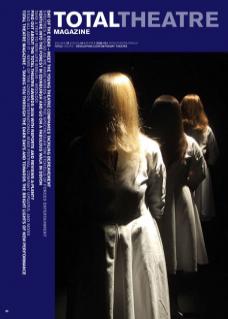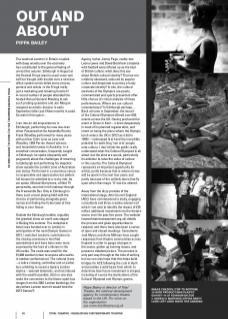The washout summer in Britain coupled with deep anxiety over the economy has contributed to the general feeling of unrest this autumn. Edinburgh in August at the Festival Fringe was its usual crazy wet self but fraught with trouble over a new box office system which failed many venues, punters and artists. Is the Fringe really just a marketing and ticketing function? A record number of people attended the heated Annual General Meeting to ask such probing questions and Jon Morgan resigned as artistic director in early September (after just fifteen months in post). So watch that space…
I ran into an old acquaintance in Edinburgh, performing his new one-man show Possessed at the Assembly Rooms. Frank Woodley performed for many years with partner Colin Lane as Lano and Woodley, 1994 Perrier Award winners and household names in Australia. In a snatched conversation, frequently caught in Edinburgh, he spoke eloquently and poignantly about the challenges of returning to Edinburgh and performing his slapstick show outside the comfort zone of Australian star status. Performed in a cavernous venue to respectable and appreciative but seldom full houses he admitted to a rocky ride. As we spoke, Michael Barrymore, vilified TV personality, scurried in full make-up through the Freemantle Bar. Only in Edinburgh is there such a level playing field with the chance of performing alongside great names and finding the fickle twist of fate falling in your favour.
Outside the Edinburgh bubble, arguably the greatest show on earth was staged in Beijing this summer. The metaphoric baton was handed over to London in anticipation of the next Olympic Games in 2012. I watched London’s contribution to the closing ceremony in horrified astonishment and have been even more surprised by the lack of criticism in the UK media. The scale was small for the 91,000 stadium (clear to anyone who works in outdoor performance). The cultural icons – a zebra crossing, umbrellas and a London bus unfolding to reveal a topiary London skyline – seemed tokenistic, and not imbued with the wealth possible. (Did no-one else make the connection to the blown apart bus images from the 2007 London bombings, the day before London learnt it would host the 2012 Games?)
Ageing rocker Jimmy Page, reality star Leona Lewis and David Beckham complete with football were offered up as the best of British culture: what does this say about British cultural identity? That we are celebrity obsessed, seduced by popular culture and desperate to portray a funky corporate identity? In situ, the cultural elements of the Olympics are poorly commentated and sports presenters offer little chance of critical analysis of these performances. Where are our cultural commentators? In Edinburgh perhaps… Back at home in September, the launch of the Cultural Olympiad offered over 600 events across the UK. Having produced the event in Dover in Kent – a town desperately in need of its planned regeneration, and intent on being the place where the Olympic torch enters the UK in 2012 (as it did in 1948) – I witnessed first hand the incredible potential for switching ‘non arts’ people onto culture. I don’t think the public really understand what the Cultural Olympiad is all about, but the aims are sound, particularly its ambition to raise the value of culture in this country. The Cultural Olympiad represents an important opportunity for artists, partly because that is where money will be spent in the next four years and partly because of the unlikely doors that fly open when that magic ‘O’ word is uttered.
Away from the dizzy promise of the international stage, Arts Council England (ACE) have commissioned a study, engaging consultants and three creative advisers (of which I am one) to identify the impact of £25 million additional investment into the theatre sector over the past five years. The website (www.theatreassessment.org.uk) details the process and gives opportunities to respond, and there have also been a series of open and closed meetings. Consultants Jodi Myers and Anne Millman have sought responses from theatre communities across England in order to gauge changes in the sector, gather up burning issues, and present a detailed picture. The process is only part way through at the time of writing but we can only hope that this helps build bridges for ACE following the cuts in April and provides a solid basis from which to determine how future investment is shaped, including of course the implications of the Cultural Olympiad and Olympic games.
Pippa Bailey is director of Total Theatre, the national development agency for contemporary theatre based in the UK. For more on the organisation see www.totaltheatre.org.uk

